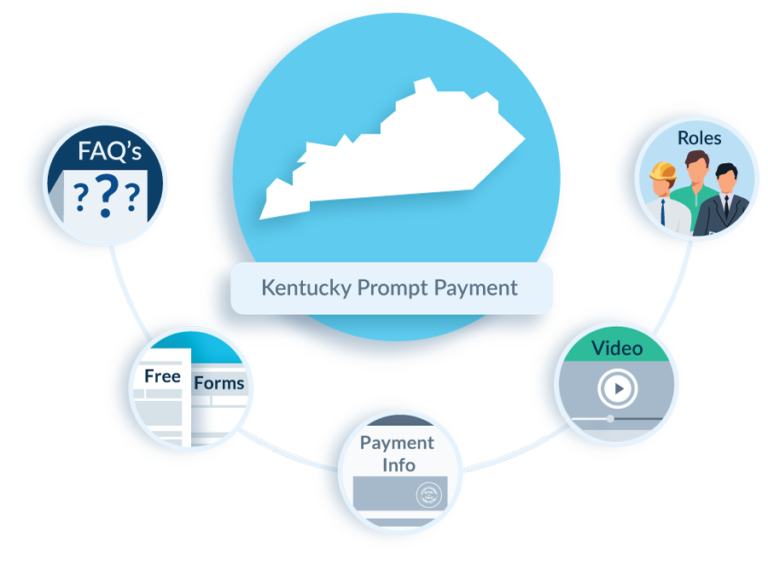Kentucky Prompt Payment Requirements
- Private Jobs
- Public Jobs
- Top Links
Prime Contractors
For Prime Contractors, progress payments due within 30 business days after request for payment, provided contrctor gives notice of nonpayment after 25 days. For education projects, progress payments due within 45 business days after request for payment. Final payment due within 30 days of substantial completion of the project.
Subcontractors
For Subcontractors, payment due within 15 business days after receipt of payment from above.
Suppliers
For Suppliers, payment due within 15 business days after receipt of payment from above.
Interest & Fees
Interest at 12% year. Attorneys' fees are only available if the nonpaying party was determined to have acted in bad faith.
Prime Contractors
For Prime (General) Contractors, progress payments due within 30 business days after request for payment, provided contrctor gives notice of nonpayment after 25 days. For education projects, progress payments due within 45 business days after request for payment. Final payment due within 30 days of substantial completion of the project.
Subcontractors
For Subcontractors, payment due within 15 business days after receipt of payment from above.
Suppliers
For Suppliers, payment due within 15 business days after receipt of payment from above.
Interest & Fees
Interest at 12% year. Attorneys' fees are only available if the nonpaying party was determined to have acted in bad faith.
Prompt payment laws are a set of rules that regulate the acceptable amount of time in which payments must be made to contractors and subs. This is to ensure that everyone on a construction project is paid in a timely fashion. These statutes provide a framework for the timing of payments to ensure cash flow and working capital.
Projects Covered by Prompt Payment in Kentucky
Generally speaking, the state of Kentucky has one set of statutes that regulate prompt payment on both private and public projects found in Ky. Rev. Stat. §371.400 et seq. and §§45.451 and 45.452. These regulations apply to all construction projects with two notable exceptions, (1) residential projects, and (2) construction contracts for regulated utilities.
Payment Deadlines
Once a prime contractor has submitted a timely, and proper request for payment, the contracting entity must release payments within 30 business days. The one exception to this rule is post-secondary education (colleges, universities, etc.), progress payments on these projects must be made 45 days after the request for payment. Upon receipt of payment from the contracting entity/owner, the prime contractor must pay their subcontractors and suppliers within 15 business days. This same 15-day turn-around period applies to all other payments made down the chain.
Penalties for Late Payment
Payments may be withheld if there is a good faith dispute concerning the validity of the request for payment. However, if no such dispute exists, and payment is either late or wrongfully withheld, interest penalties will begin to accrue. An interest rate of 12% per year (1%/month) will begin to accrue on the day the payment becomes late.
Regarding payments to prime contractors, if, after 25 days of submission of the request for payment, the contractor hasn’t been paid yet, they should notify the property owner/entity by certified mail that payment hasn’t been received and indicate the date that interest will begin accruing. As for attorney fees, they are only available if the non-paying party was deemed to have acted in bad faith.

